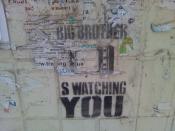George Orwell's Nineteen Eighty-Four has been considered a very powerful piece of speculative fiction since its publication in 1949. In the novel, Orwell draws on his own understanding of totalitarianism to create a very believable world dominated by a totalitarian government. Readers come to understand the potentially devastating effects of an authoritarian regime. Orwell positions readers to sympathise with his viewpoint on discourses concerning power, human nature and political ideologies. Orwell achieves this through using literary devices such as foregrounding, privileging, silences and language choices.
A major idea explored in Nineteen Eighty-Four is the importance of power, and the many ways in which it can manifest itself. Orwell presents the two major discourses concerning power early in the novel. Readers are immediately introduced to the discourse of individual power through Winston Smith. Winston is being closely watched by the political party headed by Big Brother, and Orwell conveys Winston's unhappiness with his situation by choosing negative words to describe his surroundings.
The wind is described as "vile"; the hallway that Winston walks along smells "of boiled cabbage"; and a police helicopter "snoops" into citizens' windows. Orwell's choice of language foregrounds Winston's resentment of his surroundings, and positions the reader to sympathise with Winston immediately. This early positioning strengthens Winston's discourse of individual power.
Winston's discourse is placed in opposition to the discourse of State power. The State seeks absolute power, in order to maintain its control over the people. It achieves its control through generating fear and creating uncertainty. The people are kept in fear through the knowledge of enemy forces only just being held at bay. Rocket attacks remind the proles of this on an almost daily basis. The Party heightens this state of fear by creating an uncertainty of who the enemy is, and through constant changing of...


